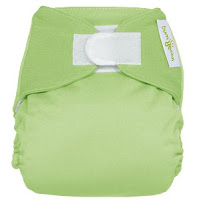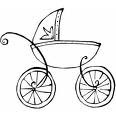Wednesday, May 19, 2010
The Case for Cloth
My husband and I have known for some time now that we are going to be using cloth diapers when our little bean comes into this world. Much to my surprise, whenever I mention this fact to friends and family I am not greeted with encouraging words but rather with cynicism. The comments I hear most frequently include:
1) You're crazy to do that. Do you know how many times a day a baby needs to be changed? Those cloth diapers are expensive.
2) I'm not convinced. Think about how much water you're wasting by having to wash those diapers. that's not better for the environment.
3) Cloth diapers are so messy. You are going to have to scrape poop and have wet pails that smell up your entire house.
4) You don't know what it's like to have a newborn. They are so much work. Why would you give yourself additional work?
I didn't want to take this decision lightly because in some respects they are right. Cloth Diapers are more work. Just like having to wash my dishes or load my dishwasher is more work. If I could just use plastic plates every night and throw them in the garbage then my evenings would be significantly easier!
So in response to some points raised. Here are my counter arguments:
1) Yes. A newborn baby needs to be changed approximately 12 times per day and then as they get older, maybe 8 times per day. From birth to 3 years of age one child will use 5000-7000 diapers or more! The average cost of disposable diapers is $2000-$3000 per child ranging from $0.30 to $0.45 per diaper. Cloth diapers can cost you as low as $300 to approximately $1000 depending on what style you choose, how many you buy and whether you use a diaper service versus home laundering. Cloth diapers usually pay for themselves within a six month period. And of course they can be used for a second or third child
2) Disposable diapers are the largest non-recyclable component of household garbage. One child from birth to 3 years of age will create approximately 3 tons of garbage if using disposable diapers. In Canada, over 4 million disposable diapers are discarded per day (1.6 billion per year)! Disposable diapers make up the third largest source of solid waste in landfills (after paper products and food containers) and may take up to 500 years to decompose. Also, the human waste is going into our landfills (which is actually prohibited by law). Instructions on disposable diaper packaging recommend shaking fecal matters into the toilet before disposing the diaper. This is rarely done.
Washing a load of diapers once or twice a week is roughly equivalent to flushing a toilet five times a day for a week. I will also be choosing biodegradable detergents that do not contain phosphates. Waste water from laundering your own cloth diapers is far less harmful to the environment compared to the waste water from manufacturing disposable diapers (plastic, pulp and bleached paper).
3) With today's new cloth diapers, no need to scrape poopy diapers and use wet pails. While a baby is breastfeeding, the diapers go directly into the washer. As they get older and eat solids, you can also choose to use biodegradable liners avoiding any rinsing of poopy diapers. Just take the liner, flush it down the toilet and throw your diaper in your pail liner. Several decades ago, wet pails (pails filled with water) were used to store diapers waiting for laundry day but now it is recommended to keep the dirty diapers in a dry bag. On laundry day just take your pail liner to the washer, turn it inside out and dump the diapers and the bag in the wash. Today's diapers also have easy velcro or snaps..no more big pins and bulky material.
4) Yes babies are a lot of work but the only difference is doing a an extra load of laundry every 2-3 days. What is the difference when you are already doing so much laundry? Studies concluded that cloth diapers encourage babies to potty train faster than disposables, because with disposable diapers, the babies seldom feel any wetness or discomfort.The materials are breathable and do not contain superabsorbent gels (sodium polyacrylate) or toxic chemicals such as dioxin that can be found in disposable diapers. Dioxin, a by-product of the paper-bleaching process, has been linked to cancers, birth defects, liver damage and skin diseases. Babies in cloth diapers are usually changed more often because it's easier to tell when they are wet. This usually results in less diaper rashes due to bacteria and ammonia coming in contact with the baby's skin.
I understand that cloth diapering is not for everyone and I certainly don't claim to commit to using cloth diapers 100% of the time. I am sure there are instances (like on a 7 hour plane ride to Europe) where we may use a dispoable. The point is that I am going to try my best.
I am shocked that in 2010, my environmental choice is greeted with comments that I am crazy instead of kudos for trying to do a bit extra to help our planet.
Information quoted from:
Environment canada
Ottawa Cloth Diapers
Subscribe to:
Post Comments (Atom)


No comments:
Post a Comment